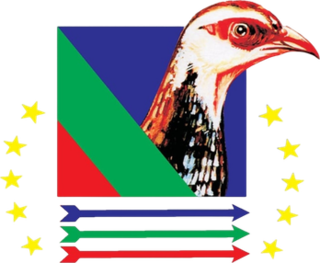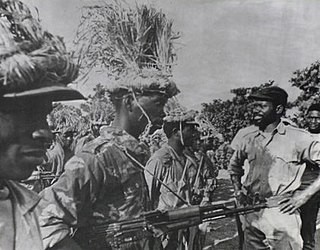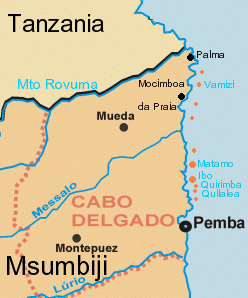Mozambique was a Portuguese colony, overseas province and later a member state of Portugal. It gained independence from Portugal in 1975.

Portuguese Mozambique or Portuguese East Africa were the common terms by which Mozambique was designated during the period in which it was a Portuguese colony. Portuguese Mozambique originally constituted a string of Portuguese possessions along the south-east African coast, and later became a unified colony, which now forms the Republic of Mozambique.

Maputo is the capital, and largest city of Mozambique. Located near the southern end of the country, it is within 120 kilometres of the borders with Eswatini and South Africa. The city has a population of 1,088,449 distributed over a land area of 347.69 km2 (134.24 sq mi). The Maputo metropolitan area includes the neighbouring city of Matola, and has a total population of 2,717,437. Maputo is a port city, with an economy centered on commerce. It is also noted for its vibrant cultural scene and distinctive, eclectic architecture. Maputo was formerly named Lourenço Marques until 1976.

Samora Moisés Machel was a Mozambican military commander and political leader. A socialist in the tradition of Marxism–Leninism, he served as the first President of Mozambique from the country's independence in 1975.

FRELIMO is a democratic socialist political party in Mozambique. It has been the country's ruling party since 1977.

RENAMO is a Mozambican political party and militant group. The party was founded with the active sponsorship of the Rhodesian Central Intelligence Organisation (CIO) in May 1977 from anti-communist dissidents opposed to Mozambique's ruling FRELIMO party. RENAMO was initially led by André Matsangaissa, a former senior official in FRELIMO's armed wing, and was composed of several anti-communist dissident groups which appeared immediately prior to, and shortly following, Mozambican independence. Matsangaissa, who died in 1979, was succeeded by Afonso Dhlakama, who led the organization until his death in 2018. He was succeeded by Ossufo Momade.
The Rome General Peace Accords, officially the General Peace Accords, was a peace treaty signed between the government of Mozambique and RENAMO, ending the Mozambican Civil War on October 4, 1992. Negotiations preceding the agreement began in July 1990. They were brokered by a team of four mediators, two members of the Community of Sant'Egidio, Andrea Riccardi and Matteo Zuppi, as well as Bishop Jaime Gonçalves and Italian government representative Mario Raffaelli. The delegation of the Mozambican government was headed by Armando Guebuza, who went on to become President of Mozambique. The RENAMO delegation consisted of Raul Domingos, José de Castro, Vicente Ululu, Agostinho Murrial, João Almirante, José Augusto and Anselmo Victor. The accords were then signed by the then-president of Mozambique Joaquim Chissano, and by the leader of RENAMO, Afonso Dhlakama.

The Portuguese Colonial War, also known in Portugal as the Overseas War or in the former colonies as the War of Liberation, and also known as the Angolan, Guinea-Bissau and Mozambican War of Independence, was a 13-year-long conflict fought between Portugal's military and the emerging nationalist movements in Portugal's African colonies between 1961 and 1974. The Portuguese regime at the time, the Estado Novo, was overthrown by a military coup in 1974, and the change in government brought the conflict to an end. The war was a decisive ideological struggle in Lusophone Africa, surrounding nations, and mainland Portugal.

The Mozambican Civil War was a civil war fought in Mozambique from 1977 to 1992. Like many regional African conflicts during the late twentieth century, the impetus for the Mozambican Civil War included local dynamics exacerbated greatly by the polarizing effects of Cold War politics. The war was fought between Mozambique's ruling Marxist Mozambique Liberation Front (FRELIMO), the anti-communist insurgent forces of the Mozambican National Resistance (RENAMO), and a number of smaller factions such as the PRM, UNAMO, COREMO, UNIPOMO, and FUMO.

The Mozambican War of Independence was an armed conflict between the guerrilla forces of the Mozambique Liberation Front or FRELIMO and Portugal. The war officially started on September 25, 1964, and ended with a ceasefire on September 8, 1974, resulting in a negotiated independence in 1975.

The People's Republic of Mozambique was a socialist state that existed in present-day Mozambique from 1975 to 1990.

Operation Gordian Knot was the largest and most expensive Portuguese military campaign in the Portuguese overseas province of Mozambique, East Africa. The operation was carried out in 1970, during the Portuguese Colonial War (1961–1974). The objectives of the campaign were to close down the Mozambique Liberation Front (FRELIMO)'s infiltration routes across the Tanzanian border and to destroy permanent FRELIMO bases inside the liberated zones in Northern Mozambique. Gordian Knot was a seven-month long campaign ultimately employing thirty-five thousand men, and was almost successful since it destroyed most guerrilla camps located inside FRELIMO's liberated zones and captured large numbers of rebels and armaments, forcing FRELIMO to retreat from their bases and outposts in the provinces. The operation ultimately failed when FRELIMO forces regrouped and thrust further south into the province of Tete, opening a new front and overstretching the Portuguese Army. The failure of Gordian Knot helped fuel the discontent that led to the Carnation Revolution in April 1974.

Filipe Jacinto Nyusi is a Mozambican politician serving since 2015 as the fourth President of Mozambique. He is the current leader of FRELIMO, the party that has governed Mozambique since its independence from Portugal in 1975. Additionally, he has served as the Chairman of the Southern African Development Community since August 2020. During his time in office, President Nyusi has promoted peace and security, and signed multiple agreements with the main opposition parties, RENAMO, to bring a definitive and lasting peace to Mozambique.

Uria Timoteo Simango was a Mozambican Presbyterian minister and prominent leader of the Mozambique Liberation Front (FRELIMO) during the liberation struggle against Portuguese colonial rule. His precise date of death is unknown as he was extrajudicially executed along with several other FRELIMO dissidents and his wife, Celina by the post-independence government of Samora Machel.

Mozambique–Portugal relations are the bilateral relations between the Republic of Mozambique and the Portuguese Republic. Both nations are members of the Community of Portuguese Language Countries and the United Nations.
Jorge Pereira Jardim was a Portuguese agronomist and an entrepreneur in Mozambique, who was Secretary of State in the government of António de Oliveira Salazar.

The Victoria Falls Conference took place on 26 August 1975 aboard a South African Railways train halfway across the Victoria Falls Bridge on the border between the unrecognised state of Rhodesia and Zambia. It was the culmination of the "détente" policy introduced and championed by B. J. Vorster, the Prime Minister of South Africa, which was then under apartheid and was attempting to improve its relations with the Frontline States to Rhodesia's north, west and east by helping to produce a settlement in Rhodesia. The participants in the conference were a delegation led by the Rhodesian Prime Minister Ian Smith on behalf of his government, and a nationalist delegation attending under the banner of Abel Muzorewa's African National Council (UANC), which for this conference also incorporated delegates from the Zimbabwe African National Union (ZANU), the Zimbabwe African People's Union (ZAPU) and the Front for the Liberation of Zimbabwe (FROLIZI). Vorster and the Zambian President Kenneth Kaunda acted as mediators in the conference, which was held on the border in an attempt to provide a venue both sides would accept as neutral.
Alcora Exercise or simply Alcora was a secret military alliance of South Africa, Portugal, and Rhodesia, formally in force between 1970 and 1974. The code name "Alcora" being an acronym for "Aliança Contra as Rebeliões em Africa".
Alberto Massavanhane was a Mozambican diplomat, teacher, and the first Mayor of Maputo. After the signing of Lusaka Accord, in 1974, Massavanhane was nominated by Frelimo as Mayor of Lourenço Marques during the transition government, becoming the first Mozambican to be President of the Executive Council of Maputo after Independence of Mozambique in 1975. In 1983 Alberto Massavanhane was again called to be the head of Maputo local government, before being designated as Ambassador of Mozambique in the Kingdom of Sweden, also covering Denmark, Finland, Iceland and Norway, from 1988 until his death in 1993.

The history of Maputo, the capital of Mozambique, traces its origins back over 500 years, when a fishing village developed by Maputo Bay on the site where the modern city of Maputo now stands. The first Europeans to discover the bay were Portuguese navigators led by António de Campo in 1502. In 1544, the Portuguese merchant and explorer Lourenço Marques reached the bay and named it Delagoa Bay. The Portuguese established a fort on the site, but were soon forced to abandon it. In 1721, the Dutch East India Company established Fort Lydsaamheid on the bay, but abandoned it due to conflicts with local Africans and the unhealthy environment. In the mid-18th century, the Portuguese returned to the bay, selling ivory to British ships carrying Indian textiles. In 1773, William Bolts of the Trieste Company reached the bay and claimed it for the Holy Roman Empire. Bolts and the Austrians were forced out in 1781 by Portuguese ships sent from Goa.














